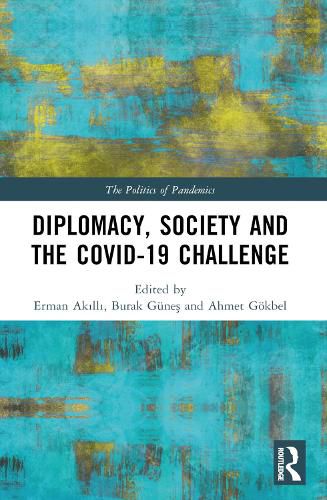Readings Newsletter
Become a Readings Member to make your shopping experience even easier.
Sign in or sign up for free!
You’re not far away from qualifying for FREE standard shipping within Australia
You’ve qualified for FREE standard shipping within Australia
The cart is loading…






Diplomacy, Society and the COVID-19 Challenge brings together authors from various disciplinary backgrounds to examine the impacts of the pandemic on world politics and international relations, focusing on diplomacy and national, regional, and global responses to COVID-19.
The authors adopt a critical perspective which questions the general assumption that security is only related to state security. The book's first part deals with diplomacy and COVID-19, exploring forms such as virtual, digital, and science diplomacy. The second part, on national and regional responses to COVID-19, provides a detailed evaluation of the foreign policies of states and regional actors and the national/regional impacts of the pandemic. The third part investigates the responses of international organisations, such as NATO and the OECD, to COVID-19's transformative and disruptive effects.
This book will be of interest to students, scholars, and researchers of international relations, diplomacy, security studies, global governance, political science, political economy, and global public health, especially those with a particular focus on COVID-19 and how it has changed the world.
$9.00 standard shipping within Australia
FREE standard shipping within Australia for orders over $100.00
Express & International shipping calculated at checkout
Diplomacy, Society and the COVID-19 Challenge brings together authors from various disciplinary backgrounds to examine the impacts of the pandemic on world politics and international relations, focusing on diplomacy and national, regional, and global responses to COVID-19.
The authors adopt a critical perspective which questions the general assumption that security is only related to state security. The book's first part deals with diplomacy and COVID-19, exploring forms such as virtual, digital, and science diplomacy. The second part, on national and regional responses to COVID-19, provides a detailed evaluation of the foreign policies of states and regional actors and the national/regional impacts of the pandemic. The third part investigates the responses of international organisations, such as NATO and the OECD, to COVID-19's transformative and disruptive effects.
This book will be of interest to students, scholars, and researchers of international relations, diplomacy, security studies, global governance, political science, political economy, and global public health, especially those with a particular focus on COVID-19 and how it has changed the world.